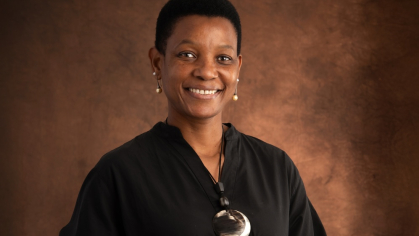Chancellor Tonya Smith-Jackson Extols the Power of Art and Education at Express Newark Event

The opening of RHYTHM CHANGES–a tribute to joy, improvisation and community–marked the start of a new season of art and conversation at Express Newark. It was also an opportunity for Rutgers University–Newark Chancellor Tonya Smith-Jackson to proclaim love for her new hometown and describe her vision for the future.
In a fireside chat with Express Newark co-director and jazz artist Stefon Harris, Smith-Jackson shared childhood memories–including the humiliating experience of having a teacher destroy her holiday artwork–and her passion for the transformative value of education. She also emphasized the importance of art and its connection to science.
But the first question from Harris was about Newark.
“How has it been arriving in a city like this that has such a great tradition of resilience?” he asked.
“There’s something about this city. I’ve lived in a lot of different places, but the warmth that I feel here, I’ve never felt before. I can truly say this. I’ve had an amazing welcome,’’’ answered Smith-Jackson, who’s been getting to know Newark by walking the city with her husband, Curtis Jackson (“Not 50 Cent,” she quipped, a reference to the rapper who shares the same name.“He’s the OG Curtis Jackson.”)
“We started walking around a lot when we came. We were using the rhythm of the city to connect. We feel this place. We didn't have to intellectualize it. We felt something deep inside. There’s something about Newark, that on day 69 of being here. I feel right at home. This has become a home in my heart,’’ she said.
RHYTHM CHANGES, which features many Newark artists, in addition to national and international creators, includes work inspired by the city. More than 325 visitors attended the event, which coincided with Newark Arts Week and features six exhibitions that include art, design, digital storytelling, music, and performance.
“Rhythm becomes a metaphor for being connected, staying active and moving forward,’’ said Express Newark Co-Director Nick Kline, who introduced Smith-Jackson. “It’s inspiring and galvanizing to see our new chancellor both in person and on Instagram connecting with students and community.’’
Smith-Jackson described herself as an art lover who takes her time when strolling museums and galleries.“Sometimes I’ll stand in front of a work, and I’ll stand there for a long time and my husband will say, ‘what are you looking at, let’s go on to the next one.’ But what I’m doing is having a conversation with the piece,’’ she said. “That’s what’s so important and powerful about art. Art draws you into that conversation.’’
But she confessed to a near-phobia of creating art herself, which she traced back to a teacher who tore up her attempts at a classroom art project.
“We were making angels to go on a Christmas tree. She said, ‘This is horrible. Go back and do it again,’’’ Smith-Jackson recalled.
The teacher destroyed her first and second angels, and after the third try, Smith-Jackson tore it up herself. The experience convinced her that educators have the power to crush spirits or unlock potential.
“When you have people like that teacher, they are probably, each and every day, wiping out some really brilliant artists and mathematicians,” she said. “That’s why it’s so important to have great educators, who believe we all come here with something, and all you have to do is get it out of us and make it beautiful.”
“That’s why Express Newark is so important,’’ she added. “We’re pulling that out of people and not destroying it. People are already artists, we just want to get it out of you.’’
Throughout her conversation with Harris, Smith-Jackson drew parallels between artistic creativity and scientific inquiry. As a scholar of human factors and systems engineering with a deep background in research, she sees the fusion of art and science as a way to expand our understanding of the world.
“Einstein was trying to tell us that there isn’t anything called time—there is only motion and space,” she said. “Art is the manipulation of our perception of motion and space. If we could get little kids to understand art and physics together, there is so much more we could do.’’
Jazz, she added with a nod toward Harris, “will teach you about math.”
That interdisciplinary vision is part of her broader goal for Rutgers–Newark: to reach the highest classification for research universities, the R1 level.
“We are currently R2, which includes research and creative works,” she explained. “The highest level of research is R1. If you get there, the economy around you will boom. Corporations will want to come because they know they’re going to find the best artists, the best researchers.”
R1 status is a tool for collective empowerment, she said. “For every dollar we get, we’re spending it back into the community. That is why it helps the economy grow.”
As an anchor institution, Rutgers-Newark’s mission is to ensure that the benefits of higher education reach the city’s residents. “Part of our anchor mandate is for us to give even more, create more jobs, have more events in the city. That is living up to the anchor expectation.”
So much is possible when education is pursued and valued, she said.
“I learned very early from my parents that education is liberation,” she said.“The more opportunity pathways I can build for people, then I’m likely to get to my own salvation. Salvation to me is helping others get there. All I want to do, in terms of my own purpose and meaning, is to do everything I can to help them get there.”


